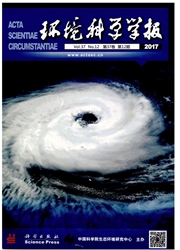

 中文摘要:
中文摘要:
研究了二氧化硫(SO2)衍生物--亚硫酸钠和亚硫酸氢钠混合物(分子比为3:1),对小鼠心、肝、肺中蛋白质的氧化损伤作用,探讨其分子作用机制.连续5 d对动物腹腔注射SO2衍生物,每天注射剂量为0、0.025、0.100、0.400 g·kg^-1.用2,4-二硝基苯肼比色法测定不同器官组织中蛋白质羰基含量.结果表明,SO2衍生物染毒剂量为0.025、0.100 和0.400 g·kg^-1时,小鼠心、肝、肺蛋白质羰基含量染毒组与对照组相比均呈现不同程度的增加,不同器官羰基含量增量大小的次序为:肝>肺>心;其染毒剂量与心、肝、肺蛋白质羰基含量之间存在明显的剂量效应关系(p<0.05),线性拟合确定系数分别为0.894、0.893和0.903。由此认为,SO2衍生物可引起小鼠心、肝、肺组织蛋白质的氧化损伤,以及不同组织器官的蛋白质氧化损伤程度不同。
 英文摘要:
英文摘要:
To study the protein oxidative damage and its molecular mechanism induced by sulfur dioxide (SO2 ) derivatives including sodium sulfite and sodium hisulfite mixture (3: 1, mol)in hearts, livers and lungs of mice. The mice had been treated with abdominal cavity injection of sulfur dioxide derivatives at different concentrations ( 0,0. 025,0.100,0. 400 g·kg ^- 1 ) once per day for 5 days. The protein earbonyl content was quantitated by using spectro photometry with 2,4-dinitrophenyl-hydrazine (DNPH). It was shown that SO2 derivatives might increase the carhonyl content of proteins from livers,lungs and hearts of mice in a dose-dependent manner. The order of increasing in carhonyl content of proteins was liver 〉 lung 〉 heart. The correlation coefficient was respectively 0. 893,0. 903 and 0. 894 ( P = 0.05 ). There are significantly the dose-effect relation between the dose of the chemicals and protein carhonyl content. These results lead to a conclusion that sulfur dioxide derivatives could cause oxidation damage of proteins from hearts, livers and lungs of mice. The extent of protein oxidative damage is different in different organs.
 同期刊论文项目
同期刊论文项目
 同项目期刊论文
同项目期刊论文
 期刊信息
期刊信息
